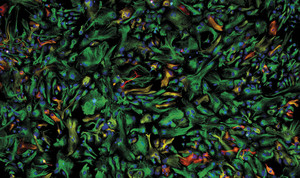
Paolo d’Errico
Sleep deprivation alters the activity of astrocytes (in green and blue) and may be harmful to the brainPaolo d’ErricoIf you don’t like to waste time sleeping, here’s a note of caution: sleep deprivation can lead the brain to self-destruct. At least that is the implication of an experiment conducted with mice at the University of Wisconsin in the U.S. and Marche Polytechnic University in Italy. The study shows that sleep loss causes an increase in the activity of astrocytes—brain cells responsible for removing unneeded connections, or synapses, and making circuits more efficient (Journal of Neuroscience, May 24, 2017). This kind of cerebral housekeeping happens normally during sleep. In the study, when the animals got enough sleep, the researchers found that 6% of synapses were removed. That level of cleanup is considered healthy. The percentage rose to 8% when the mice were kept awake for another eight hours, and to 13.5% when sleep deprivation became chronic and drastic, lasting for five consecutive days. The overall conclusion of the study is that excessive cleanup of synapses due to an extended period of sleeplessness can cause brain damage. Earlier studies have cited the damage that chronic sleep deprivation can cause to the functioning of other cells, such as microglia, which are responsible for the brain’s immune defense system. Too little sleep is believed to cause the microglia to change their pattern of activity, and such a disturbance may be associated with the development of dementias such as Alheimer’s disease.
Republish